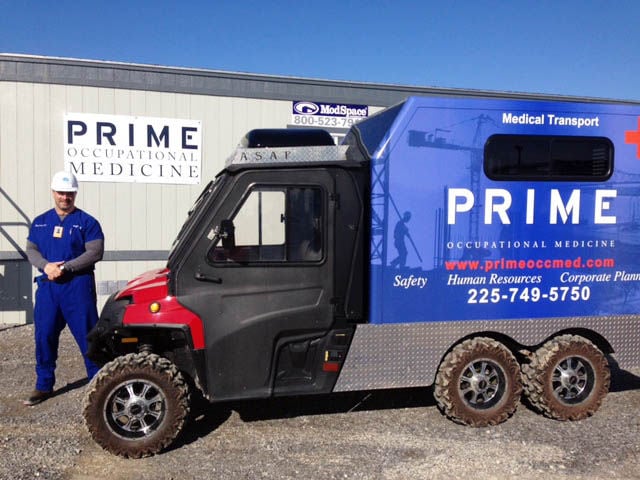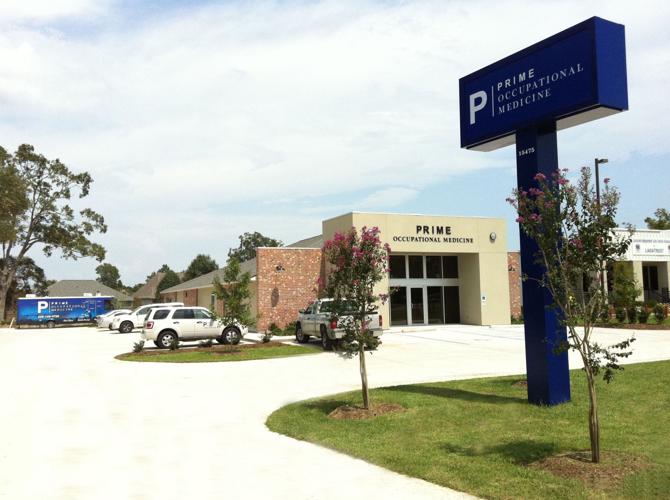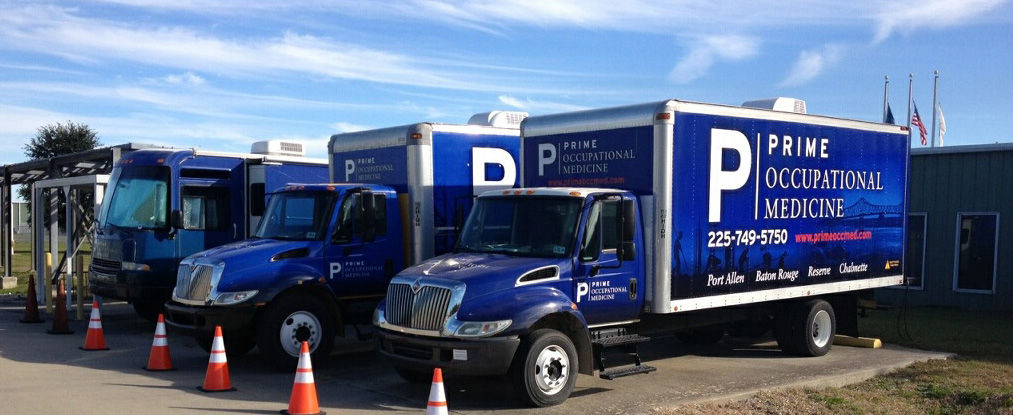Baton Rouge-based Prime Occupational Medicine doubled in size over the past five years to eight clinics and about 200 employees, and expects to do so again with plans to expand to New Orleans and Texas.
Prime targets large employers, such as those building the megaprojects that have cropped up along the Gulf Coast in the past few years. For example, there are 9,000 workers at the Cameron liquified natural gas job site in Sulphur. To handle those workers' needs, Prime has a number of medical professionals on-site, and they coordinate care with Prime's medical director and local providers. Prime also has assigned an ambulance and emergency response vehicles to the job site.
"Unfortunately, when you work construction, you work with big wrenches and big tools and big toys. We see a lot of injuries," said Sean Connor, vice president of business development. "We try to treat the employee like an NFL athlete. If he's hurt, let's get him fixed. If he needs surgery, let's have it today."
It's a different approach from the one taken by many nonindustrial companies. Typically, if a worker gets hurt in one of those businesses, it might take a week to secure a doctor's appointment, another week or two to make an appointment with a specialist and another week to get the insurance company's approval for an MRI or other test.
A self-insured petrochemical company doesn't want to wait 20 or 30 days just to find out what needs fixing, and more time for the actual treatment and recovery, Connor said. The companies know that the longer an employee sits at home, the less likely he or she is going to return to work and the more money that will cost the employer.
Although work-related injuries and illnesses in Louisiana dropped 35 percent from 2005 to 2015, the costs of injuries that force employees to miss more than seven days of work were both higher and grew faster than in most other states. A report from the Workers' Compensation Research Institute shows in those instances, total costs per claim in Louisiana averaged more than $30,000 for a 12-month period.
Prime tries to reduce the risk of accidents ahead of time by making sure clients hire the safest employees.
That way, a company isn't setting itself up for failure, Connor said. If a worker is physically unable to do something the job requires, the odds are much higher that person will be injured.
Blayne Rush, president of The Ambulatory M&A Advisor, said the growth in occupational medicine is being driven by employers’ recognition that it saves time and money and results in a more productive and healthy workforce.
"Furthermore, employers are looking at the health of their employees holistically versus thinking of occupational medicine as simply worker's compensation visits," Rush said. "Some employers are seeing 'occmed' as part of their wellness program and also offering onsite primary care clinics."
Prime Director of Sales Paul Crain said the company's results also have drawn the attention of worker's compensation insurers — for good reason.
Prime helped the Iberville Parish School Board reduce its worker's compensation claims by 66 percent and the cost of claims by 60 percent in one year, Crain said. Prime accomplished that by doing the same thing for the School Board that it does for other clients: get workers healthy and get them back to work quickly.
Connor said Prime has benefited from the care model developed by founder Dr. Luke Lee, who is board-certified in occupational medicine, and from focusing solely on occupational medicine, unlike some smaller clinics that also provide urgent care, Connor said. It's an approach large employers appreciate. They don't want little Johnny and his cold sitting in the waiting room with their employees.
"These guys are workers. They're very expensive. They're very valuable," he said. "Their employers want them in and out and on the job site."
There's another good reason to focus on occupational medicine. It's more lucrative.
Eddie Stahl, clinical solutions consultant for Net Health's Agility 360, said the reimbursements for worker's compensation are much better than for regular commercial insurance. In addition, the clinics can set their own rates for drug screening, audiology tests and other services specific to occupational medicine.
The occupational medicine-centric approach is one reason that Prime's Baton Rouge-area clients, who are also building industrial plants in south Texas, want Prime clinics nearby. The strategy also has helped Prime boost annual revenue to more than $15 million.
Despite the demand to go west, Prime's next move will be to New Orleans, where it already has strategic alliances with worker's compensation companies.
Connor said New Orleans is a natural fit, filling a gap between Prime's clinics in Chalmette and Reserve.
The move to Texas will require Prime to open multiple clinics in the "Golden Triangle," the southeastern portion of the state between Beaumont, Port Arthur and Orange.
Prime offers "call-out" services 24 hours a day, with providers making 800 to 900 after-hours visits a year. Putting one clinic in a remote location would force providers to make 20 visits or more a night, quickly overloading the staff, he said. In addition, the clinics help serve as a base for staffing job sites, so adding one clinic makes no sense.
Connor said Prime will make the move to New Orleans and Texas within the next 24 months. Once the new locations are established, the company will pause to make sure each is adhering to Prime's operations model and culture. The goal is to have the clinics in Texas treat patients the way the locations in Sulphur do, which treat patients the same way the locations in the Baton Rouge area do.
"The worst thing you can do is expand and fail to provide consistency and quality," Connor said.
Prime already has experience in exporting its care model. A number of its clients are using Prime's proprietary software to manage workers' care at out-of-state clinics. The software provides real-time information and oversight of the company's operations outside the Baton Rouge area. A team of nurses checks the medical records entered, looking at everything from forms being properly signed to treatment procedures being followed.
The software is a huge part of Prime's business, Connor said. The company believes its doctors and clinics are "the best of the best," but for now, Prime's clinics stop at the Texas state line.
"With our technology, you can have our solution anywhere in the world," he said.
Last month Lee made a trip to check out international job sites. In the next month or two, Connor is scheduled to fly to the Middle East to do the same.





